“生病了”的25种英文说法
关于“生病”的25种英语表达
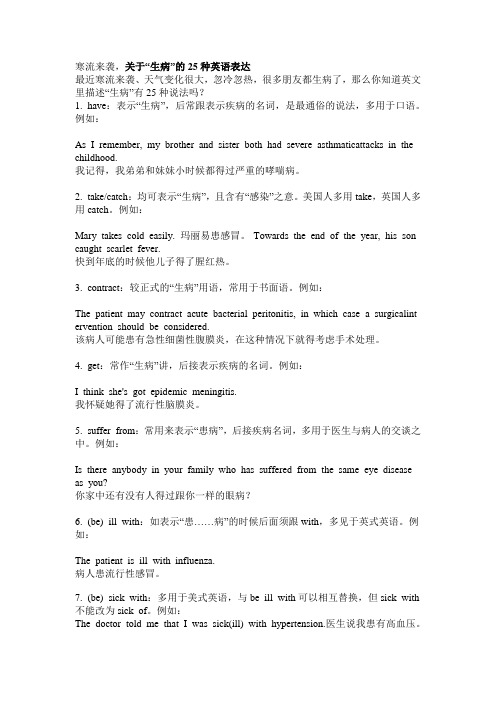
寒流来袭,关于“生病”的25种英语表达最近寒流来袭、天气变化很大,忽冷忽热,很多朋友都生病了,那么你知道英文里描述“生病”有25种说法吗?1. have:表示“生病”,后常跟表示疾病的名词,是最通俗的说法,多用于口语。
例如:As I remember, my brother and sister both had severe asthmaticattacks in the childhood.我记得,我弟弟和妹妹小时候都得过严重的哮喘病。
2. take/catch:均可表示“生病”,且含有“感染”之意。
美国人多用take,英国人多用catch。
例如:Mary takes cold easily. 玛丽易患感冒。
Towards the end of the year, his son caught scarlet fever.快到年底的时候他儿子得了腥红热。
3. contract:较正式的“生病”用语,常用于书面语。
例如:The patient may contract acute bacterial peritonitis, in which case a surgicalint ervention should be considered.该病人可能患有急性细菌性腹膜炎,在这种情况下就得考虑手术处理。
4. get:常作“生病”讲,后接表示疾病的名词。
例如:I think she's got epidemic meningitis.我怀疑她得了流行性脑膜炎。
5. suffer from:常用来表示“患病”,后接疾病名词,多用于医生与病人的交谈之中。
例如:Is there anybody in your family who has suffered from the same eye disease as you?你家中还有没有人得过跟你一样的眼病?6. (be) ill with:如表示“患……病”的时候后面须跟with,多见于英式英语。
感冒的25种表达方法
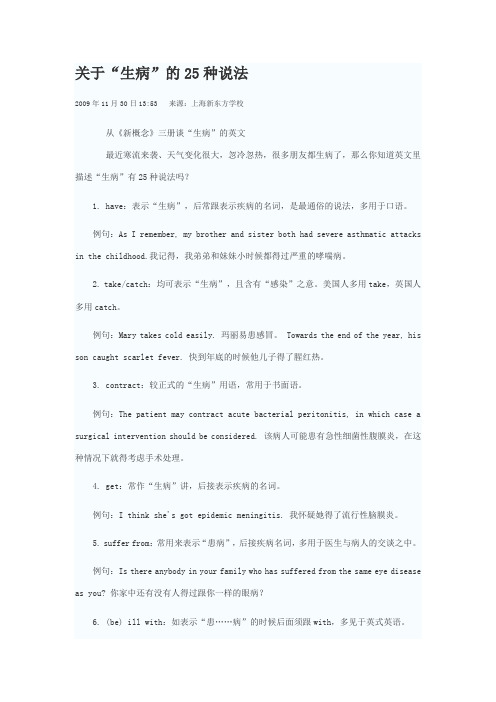
关于“生病”的25种说法2009年11月30日13:53 来源:上海新东方学校从《新概念》三册谈“生病”的英文最近寒流来袭、天气变化很大,忽冷忽热,很多朋友都生病了,那么你知道英文里描述“生病”有25种说法吗?1. have:表示“生病”,后常跟表示疾病的名词,是最通俗的说法,多用于口语。
例句:As I remember, my brother and sister both had severe asthmatic attacks in the childhood.我记得,我弟弟和妹妹小时候都得过严重的哮喘病。
2. take/catch:均可表示“生病”,且含有“感染”之意。
美国人多用take,英国人多用catch。
例句:Mary takes cold easily. 玛丽易患感冒。
Towards the end of the year, his son caught scarlet fever. 快到年底的时候他儿子得了腥红热。
3. contract:较正式的“生病”用语,常用于书面语。
例句:The patient may contract acute bacterial peritonitis, in which case a surgical intervention should be considered. 该病人可能患有急性细菌性腹膜炎,在这种情况下就得考虑手术处理。
4. get:常作“生病”讲,后接表示疾病的名词。
例句:I think she's got epidemic meningitis. 我怀疑她得了流行性脑膜炎。
5. suffer from:常用来表示“患病”,后接疾病名词,多用于医生与病人的交谈之中。
例句:Is there anybody in your family who has suffered from the same eye disease as you? 你家中还有没有人得过跟你一样的眼病?6. (be) ill with:如表示“患……病”的时候后面须跟with,多见于英式英语。
-生病-的英语口语表达

-生病-的英语口语表达-CAL-FENGHAI.-(YICAI)-Company One1"生病"的英语口语表达1. have:表示“生病”,后常跟表示疾病的名词,是最通俗的说法,多用于口语。
例如:As I remember, my brother and sister both had severe asthmaticattacks in the childhood.我记得,我弟弟和妹妹小时候都得过严重的哮喘病。
2. take/catch:均可表示“生病”,且含有“感染”之意。
美国人多用take,英国人多用catch。
例如:Mary takes cold easily. 玛丽易患感冒。
Towards the end of the year, his son caught scarlet fever.快到年底的时候他儿子得了腥红热。
3. contract:较正式的“生病”用语,常用于书面语。
例如:The patient may contract acute bacterial peritonitis, in which case a surgicalintervention should be considered.该病人可能患有急性细菌性腹膜炎,在这种情况下就得考虑手术处理。
4. get:常作“生病”讲,后接表示疾病的名词。
例如:I think she's got epidemic meningitis.我怀疑她得了流行性脑膜炎。
5. suffer from:常用来表示“患病”,后接疾病名词,多用于医生与病人的交谈之中。
例如:Is there anybody in your family who has suffered from the same eye disease as you 你家中还有没有人得过跟你一样的眼病?6. (be) ill with:如表示“患……病”的时候后面须跟with,多见于英式英语。
“生病了”的25种英文说法[精华]
![“生病了”的25种英文说法[精华]](https://img.taocdn.com/s3/m/0b6b97ca5122aaea998fcc22bcd126fff7055da3.png)
“生病了”的25种英文说法“生病了”的25种英文说法1 have:表示“生病”,后常跟表示疾病的名词,是最通俗的说法,多用于口语。
例句:As I remember, my brother and sister both had severe asthmatic attacks in thechildhood.我记得,我弟弟和妹妹小时候都得过严重的哮喘病。
2 take/catch:均可表示“生病”,且含有“感染”之意。
美国人多用take,英国人多用catch。
例句:Mary takes cold easily. 玛丽易患感冒。
Towards the end of the year, his son caught scarlet fever.快到年底的时候他儿子得了腥红热。
3 contract:较正式的“生病”用语,常用于书面语。
例句:The patient may contract acute bacterial peritonitis, in which case asurgical intervention should be considered. 该病人可能患有急性细菌性腹膜炎,在此情况下就得考虑手术处理。
4 get: 常作“生病”讲,后接表示疾病的名词。
例句:I think she's got epidemic meningitis. 我怀疑她得了流行性脑膜炎。
5 suffer from: 常用来表示“患病”,后接疾病名词,多用于医生与病人的交谈之中。
例句:Is there anybody in your family who has suffered from the same eye disease asyou? 你家中还有没有人得过跟你一样的眼病?6 (be) ill with: 如表示“患......病”的时候后面须跟with,多见于英式英语。
例句:The patient is ill with influenza. 病人患流行性感冒。
“生病了”的25种说法46552
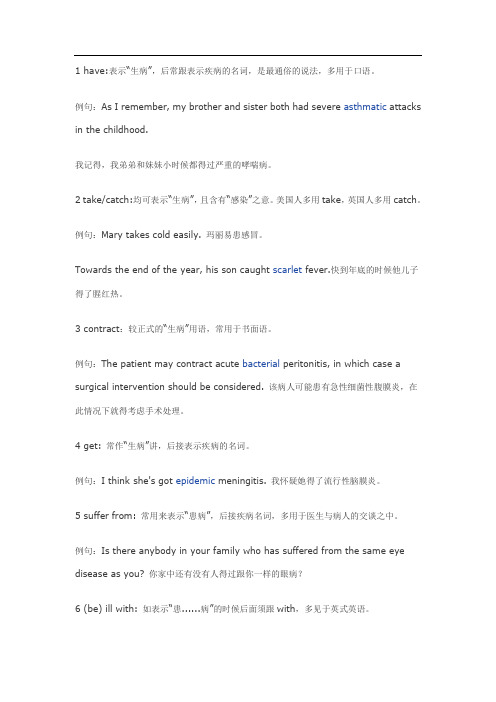
1 have:表示“生病”,后常跟表示疾病的名词,是最通俗的说法,多用于口语。
例句:As I remember, my brother and sister both had severe asthmatic attacks in the childhood.我记得,我弟弟和妹妹小时候都得过严重的哮喘病。
2 take/catch:均可表示“生病”,且含有“感染”之意。
美国人多用take,英国人多用catch。
例句:Mary takes cold easily. 玛丽易患感冒。
Towards the end of the year, his son caught scarlet fever.快到年底的时候他儿子得了腥红热。
3 contract:较正式的“生病”用语,常用于书面语。
例句:The patient may contract acute bacterial peritonitis, in which case a surgical intervention should be considered. 该病人可能患有急性细菌性腹膜炎,在此情况下就得考虑手术处理。
4 get: 常作“生病”讲,后接表示疾病的名词。
例句:I think she's got epidemic meningitis. 我怀疑她得了流行性脑膜炎。
5 suffer from: 常用来表示“患病”,后接疾病名词,多用于医生与病人的交谈之中。
例句:Is there anybody in your family who has suffered from the same eye disease as you? 你家中还有没有人得过跟你一样的眼病?6 (be) ill with: 如表示“患......病”的时候后面须跟with,多见于英式英语。
例句:The patient is ill with influenza. 病人患流行性感冒。
“生病了”的25种说法
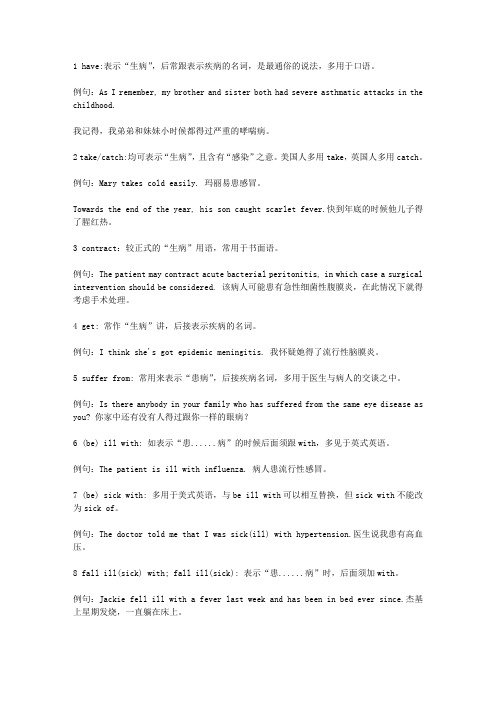
1 have:表示“生病”,后常跟表示疾病的名词,是最通俗的说法,多用于口语。
例句:As I remember, my brother and sister both had severe asthmatic attacks in the childhood.我记得,我弟弟和妹妹小时候都得过严重的哮喘病。
2 take/catch:均可表示“生病”,且含有“感染”之意。
美国人多用take,英国人多用catch。
例句:Mary takes cold easily. 玛丽易患感冒。
Towards the end of the year, his son caught scarlet fever.快到年底的时候他儿子得了腥红热。
3 contract:较正式的“生病”用语,常用于书面语。
例句:The patient may contract acute bacterial peritonitis, in which case a surgical intervention should be considered. 该病人可能患有急性细菌性腹膜炎,在此情况下就得考虑手术处理。
4 get: 常作“生病”讲,后接表示疾病的名词。
例句:I think she's got epidemic meningitis. 我怀疑她得了流行性脑膜炎。
5 suffer from: 常用来表示“患病”,后接疾病名词,多用于医生与病人的交谈之中。
例句:Is there anybody in your family who has suffered from the same eye disease as you? 你家中还有没有人得过跟你一样的眼病?6 (be) ill with: 如表示“患......病”的时候后面须跟with,多见于英式英语。
例句:The patient is ill with influenza. 病人患流行性感冒。
生病时的25种表达
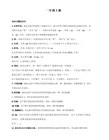
Daniel was laid up for nearly a month with chronic appendicitis. 丹尼尔患慢性阑尾炎卧床近一个月。
22 be pulled down by: 意为“患......病而病倒”。
例句:Mozart was pulled down by anaphylactoid shock suddenly at 3 yesterday afternoon.莫扎特昨天下午三点多患过敏性休克而病倒。
When having cold, children are exposed to pneumonia. 孩子感冒时易患肺炎。
14 suspect...of: 一般表示“怀疑......患......病”。
例句:On examination the patient was suspected of carcinomaof the caetum.经检查,怀疑病人患盲肠癌。
例句:The doctor told me that I was sick(ill) with hypertension.医生说我患有高血压。
8 fall ill(sick) with; fall ill(sick): 表示“患......病”时,后面须加with。
例句:Jackie fell ill with a fever last week and has been in bed ever since.杰基上星期发烧,一直躺在床上。
B: The Hilton Hotel in Paris. 巴黎的希尔顿酒店。
A: What will you dB: For Business. 商务旅行。
A: Ok, you’re through now. 好了,您可以通过了。
“生病了”的25种说法_0
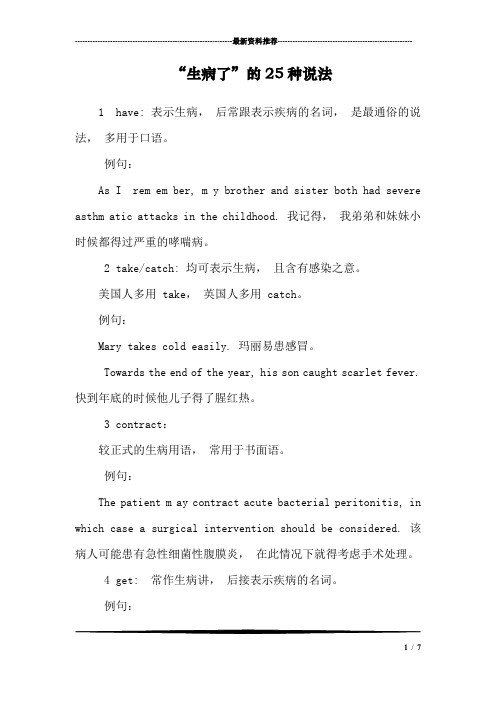
---------------------------------------------------------------最新资料推荐------------------------------------------------------“生病了”的25种说法1 have: 表示生病,后常跟表示疾病的名词,是最通俗的说法,多用于口语。
例句:As I rem em ber, m y brother and sister both had severe asthm atic attacks in the childhood. 我记得,我弟弟和妹妹小时候都得过严重的哮喘病。
2 take/catch: 均可表示生病,且含有感染之意。
美国人多用 take,英国人多用 catch。
例句:Mary takes cold easily. 玛丽易患感冒。
Towards the end of the year, his son caught scarlet fever.快到年底的时候他儿子得了腥红热。
3 contract:较正式的生病用语,常用于书面语。
例句:The patient m ay contract acute bacterial peritonitis, in which case a surgical intervention should be considered. 该病人可能患有急性细菌性腹膜炎,在此情况下就得考虑手术处理。
4 get: 常作生病讲,后接表示疾病的名词。
例句:1/ 7I think she’s got epidem ic m eningitis. 我怀疑她得了流行性脑膜炎。
5 suffer from : 常用来表示患病,后接疾病名词,多用于医生与病人的交谈之中。
例句:I s there anybody in your fam ily who has suffered from the sam e eye disease as you? 你家中还有没有人得过跟你一样的眼病? 6 (be) ill with: 如表示患......病的时候后面须跟 with,多见于英式英语。
如何用英语习语形容生病了

如何用英语习语形容生病了如何用英语习语形容生病了?下面就和大家分享地道习语:如何用英语形容生病了,希望能够帮助到大家,来欣赏一下吧。
地道习语:如何用英语形容生病了?1. be/feel under the weather用来形容“生病;觉得不舒服“的时候,病情通常是不怎么严重的。
Im feeling a bit under the weather - I think Im getting a cold.我觉得有点不舒服——可能是感冒了。
2. off-color如果你有点不舒服,但是没有特定的症状,可以这么说:Im feeling a bit off-colour today.今天我觉得有点不舒服。
或者可以说don’t feel yourself (UK)/don’t feel like yourself (US)。
3. be out of sorts既可以形容有些不舒服,也可以表示“有点不高兴“。
Ive been feeling tired and headachy and generally out of sorts. 我一直感到疲劳和头疼,总体来说有些不舒服。
4. go down with sth被传染上流感这样的传染病,就用go/come down with sth。
Half of Marthas class has gone down with flu.玛莎班上有一半的学生得了流感。
5. shake sth off意思是摆脱(疾病)。
I hope I can shake off this cold before the weekend.我希望周末之前我的感冒能好。
如果感冒一直没好,你可以说“It’s really dragging on”.6. be on the mend形容(病后)身体逐渐康复。
Shes been ill with the flu but shes on the mend now.她得了流感,但现在正逐渐好起来。
生病的英语短语

生病的英语短语现代医学已发展至今,越来越多的人倾向于采用英语作为全球医疗保健语言,以应对不同国家和地区的医疗需求和服务。
以下是一些有关生病的英语短语,可以帮助你在生病时识别和表达你的需求:1. I have a fever.发烧了。
2. I feeling sick.觉得不舒服。
3. I having trouble breathing.呼吸困难。
4. I have a headache.头疼。
5. I have a sore throat.喉咙痛。
6. I have a cold.感冒了。
7. I have an upset stomach.胃不舒服。
8. I have the flu.患了流感。
9. I think I allergic to something.想我对某种东西过敏。
10. I need something for pain relief.需要止痛药。
大多数时候,当你感觉不适时,最好的方法是去看医生。
然而,在去看医生之前,可以做一些事情来缓解症状,例如喝足够的水,补充营养,保持充足的休息和睡眠等。
一般来说,当你出现以下情况时,就可以考虑去看医生:1.热超过3天;2.疼持续两天;3.嗽超过5天;4.现突发性鼻血或咳血;5.咽困难;6.现由黄色脓液发生的呼吸道感染;7.猝死风险的症状;8.现急性腹泻;9.现急性发热和疼痛;10.染病毒性疾病。
在去医院时,除了报告你的症状外,你还可以提供一些有关你的健康历史的信息,例如过敏史、健康状况、历史性疾病等。
此外,你还可以提前准备包括你的药物记录,护照及其他医疗保险卡在内的身份证明文件。
填写良好的医疗信息可以帮助你得到更全面的治疗和护理。
无论你的症状如何,都有必要调查并尊重你的病情,密切关注你的健康状态,以便及早发现和治疗疾病。
了解有关生病的英语短语,以及如何准备去看医生,可以让你获得更全面的医疗护理。
生病了的种英文说法
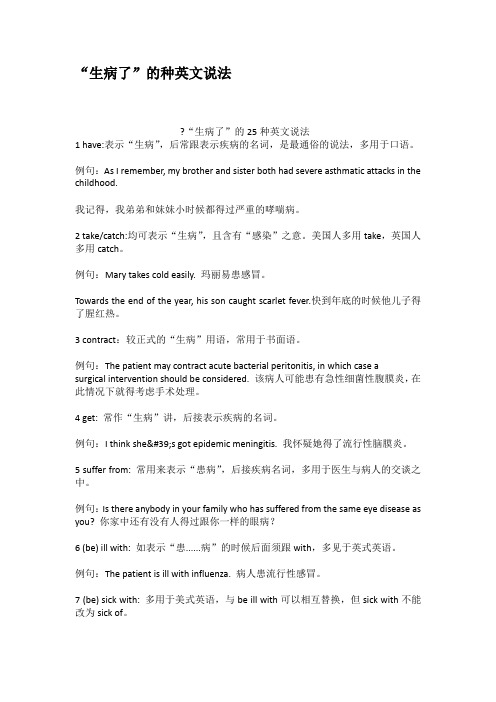
“生病了”的种英文说法?“生病了”的25种英文说法1 have:表示“生病”,后常跟表示疾病的名词,是最通俗的说法,多用于口语。
例句:As I remember, my brother and sister both had severe asthmatic attacks in the childhood.我记得,我弟弟和妹妹小时候都得过严重的哮喘病。
2 take/catch:均可表示“生病”,且含有“感染”之意。
美国人多用take,英国人多用catch。
例句:Mary takes cold easily. 玛丽易患感冒。
Towards the end of the year, his son caught scarlet fever.快到年底的时候他儿子得了腥红热。
3 contract:较正式的“生病”用语,常用于书面语。
例句:The patient may contract acute bacterial peritonitis, in which case a surgical intervention should be considered. 该病人可能患有急性细菌性腹膜炎,在此情况下就得考虑手术处理。
4 get: 常作“生病”讲,后接表示疾病的名词。
例句:I think she's got epidemic meningitis. 我怀疑她得了流行性脑膜炎。
5 suffer from: 常用来表示“患病”,后接疾病名词,多用于医生与病人的交谈之中。
例句:Is there anybody in your family who has suffered from the same eye disease as you? 你家中还有没有人得过跟你一样的眼病?6 (be) ill with: 如表示“患......病”的时候后面须跟with,多见于英式英语。
例句:The patient is ill with influenza. 病人患流行性感冒。
生病英文_精品文档
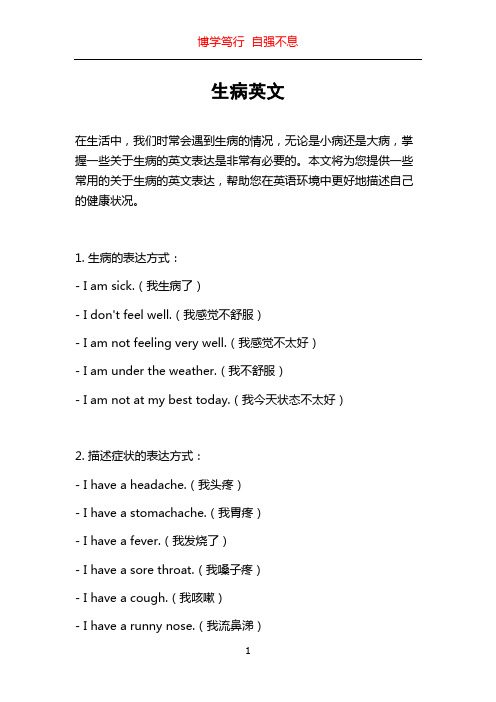
生病英文在生活中,我们时常会遇到生病的情况,无论是小病还是大病,掌握一些关于生病的英文表达是非常有必要的。
本文将为您提供一些常用的关于生病的英文表达,帮助您在英语环境中更好地描述自己的健康状况。
1. 生病的表达方式:- I am sick.(我生病了)- I don't feel well.(我感觉不舒服)- I am not feeling very well.(我感觉不太好)- I am under the weather.(我不舒服)- I am not at my best today.(我今天状态不太好)2. 描述症状的表达方式:- I have a headache.(我头疼)- I have a stomachache.(我胃疼)- I have a fever.(我发烧了)- I have a sore throat.(我嗓子疼)- I have a cough.(我咳嗽)- I have a runny nose.(我流鼻涕)- I have a rash.(我长了疹子)3. 看医生的表达方式:- I need to see a doctor.(我需要看医生)- I want to make an appointment with a doctor.(我想和医生预约)- I would like to schedule a visit to the doctor.(我想约个医生)- Can you recommend a good doctor?(你能推荐一个好医生吗?)- I think I need medical attention.(我觉得我需要医疗照顾)4. 医疗用具和药物的表达方式:- I need a prescription.(我需要处方药)- I need to buy some over-the-counter medicine.(我需要买些非处方药)- Can you recommend a pharmacy nearby?(你能推荐附近一家药店吗?)- I need a bandage for my cut.(我需要一块绷带来包扎我的伤口)- Do you have any painkillers?(你们有止痛药吗?)5. 表示希望好转的表达方式:- I hope I will get better soon.(我希望我会很快康复)- I hope I will recover quickly.(我希望我能快速恢复)- I hope this sickness won't last long.(我希望这次病不会持续太久)- I hope the treatment will be effective.(我希望治疗会有效果)- I look forward to feeling better soon.(我期待很快能感觉好一点)总之,掌握一些基本的生病英文表达对于在英语环境中描述自己的健康状况是非常重要的。
生病的英文

生病的英文生病是我们生活中常见的事情之一,无论是小感冒还是严重的疾病,我们都需要在生病期间与医生交流和理解相关的诊断、治疗和护理信息。
因此,掌握生病的基本英文表达是非常重要的。
下面列举了一些常用的生病英文词汇和句式,以便我们在需要的时候能够更好地与医生沟通。
常见疾病名称1.Fever - 发烧2.Cold - 感冒3.Flu - 流感4.Headache - 头痛5.Stomachache - 胃痛6.Sore throat - 喉咙痛7.Cough - 咳嗽8.Diarrhea - 腹泻9.Allergy - 过敏10.Asthma - 哮喘11.Diabetes - 糖尿病12.High blood pressure - 高血压13.Cancer - 癌症医疗相关词汇1.Doctor - 医生2.Nurse - 护士3.Hospital - 医院4.Clinic - 诊所5.Patient - 病人6.Prescription - 处方7.Medication - 药物8.Treatment - 治疗9.Surgery - 手术10.Test - 检查常用句式1.I am feeling sick. - 我觉得不舒服。
2.I have a fever. - 我发烧了。
3.I have a headache. - 我头疼。
4.I am coughing. - 我在咳嗽。
5.My stomach hurts. - 我肚子疼。
6.I need to see a doctor. - 我需要看医生。
7.Can you recommend a good hospital? - 你能推荐一个好医院吗?8.Do I need to take any medication? - 我需要服用药物吗?9.How long will it take to recover? - 需要多久才能康复?10.Are there any side effects to this treatment? - 这种治疗有没有副作用?寻求帮助与表达需求当我们生病时,我们需要向他人寻求帮助并表达出我们的需求。
英语 生病的表达方法
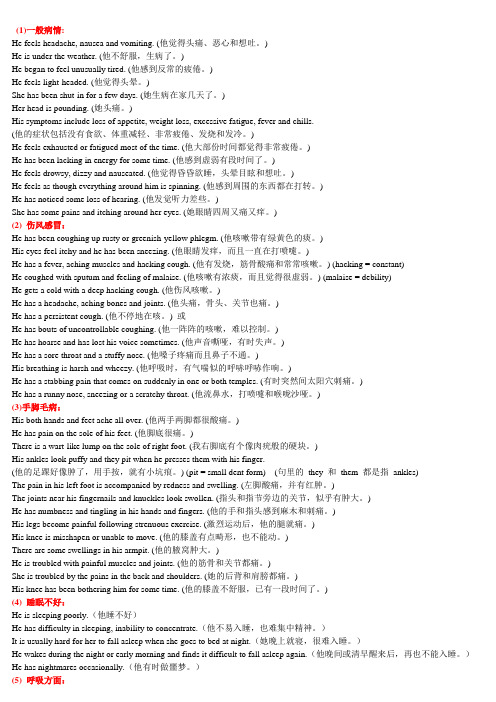
(1)一般病情:He feels headache, nausea and vomiting. (他觉得头痛、恶心和想吐。
)He is under the weather. (他不舒服,生病了。
)He began to feel unusually tired. (他感到反常的疲倦。
)He feels light-headed. (他觉得头晕。
)She has been shut-in for a few days. (她生病在家几天了。
)Her head is pounding. (她头痛。
)His symptoms include loss of appetite, weight loss, excessive fatigue, fever and chills.(他的症状包括没有食欲、体重减轻、非常疲倦、发烧和发冷。
)He feels exhausted or fatigued most of the time. (他大部份时间都觉得非常疲倦。
)He has been lacking in energy for some time. (他感到虚弱有段时间了。
)He feels drowsy, dizzy and nauseated. (他觉得昏昏欲睡,头晕目眩和想吐。
)He feels as though everything around him is spinning. (他感到周围的东西都在打转。
)He has noticed some loss of hearing. (他发觉听力差些。
)She has some pains and itching around her eyes. (她眼睛四周又痛又痒。
)(2) 伤风感冒:He has been coughing up rusty or greenish-yellow phlegm. (他咳嗽带有绿黄色的痰。
)His eyes feel itchy and he has been sneezing. (他眼睛发痒,而且一直在打喷嚏。
生病英语表达法
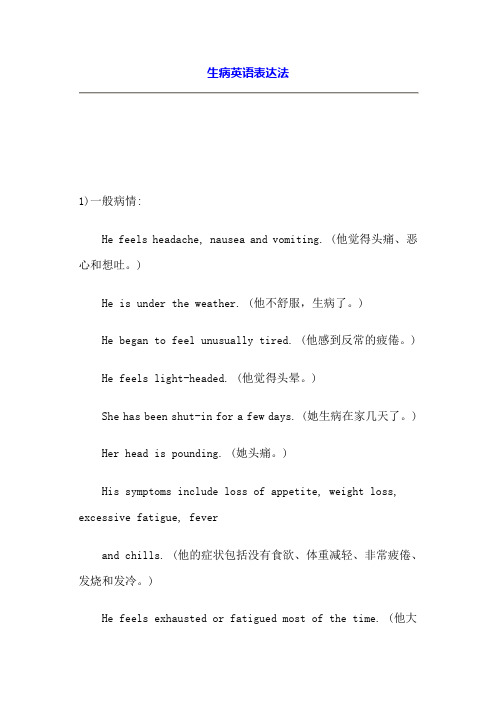
生病英语表达法1)一般病情:He feels headache, nausea and vomiting. (他觉得头痛、恶心和想吐。
)He is under the weather. (他不舒服,生病了。
)He began to feel unusually tired. (他感到反常的疲倦。
) He feels light-headed. (他觉得头晕。
)She has been shut-in for a few days. (她生病在家几天了。
) Her head is pounding. (她头痛。
)His symptoms include loss of appetite, weight loss, excessive fatigue, feverand chills. (他的症状包括没有食欲、体重减轻、非常疲倦、发烧和发冷。
)He feels exhausted or fatigued most of the time. (他大部份时间都觉得非常疲倦。
)He has been lacking in energy for some time. (他感到虚弱有段时间了。
)He feels drowsy, dizzy and nauseated. (他觉得昏昏欲睡,头晕目眩和想吐。
)He feels as though everything around him is spinning. (他感到周围的东西都在打转。
)He has noticed some loss of hearing. (他发觉听力差些。
) She has some pains and itching around her eyes. (她眼睛四周又痛又痒。
)(2) 伤风感冒:He has been coughing up rusty or greenish-yellow phlegm. (他咳嗽带有绿黄色的痰。
)His eyes feel itchy and he has been sneezing. (他眼睛发痒,而且一直在打喷嚏。
25种方式说“生病”

25种方式说“生病”
许雅宁
【期刊名称】《疯狂英语:初中天地》
【年(卷),期】2009()2
【摘要】季节交替期间天气变化大,人特别容易生病。
疾病的类型数不胜数,生病的英文表达也不仅限于have、get、catch哦。
其实英文里描述"生病"的方式有25种之多——1.have:表示"生病",后常跟表示疾病的名词,是最通俗的说法,多用于口语。
【总页数】2页(P60-61)
【关键词】疾病;喉炎;呼吸道感染
【作者】许雅宁
【作者单位】
【正文语种】中文
【中图分类】G63
【相关文献】
1.生病了被骗了父母遇事为什么总想“瞒”不愿“说” [J], 许红
2.运用"微课教学模式"进行说课设计r——以中班语言课《兔子妈妈生病了》为例[J], 范萍萍
3.院士专家说:生不生病,我们自己决定! [J], 《康复(健康家庭)》编辑部
4.生病始于累,对疲劳说再见 [J], 甘露
5.说生病 [J], 魏正贤
因版权原因,仅展示原文概要,查看原文内容请购买。
描述病情的25句英语

描述病情的25句英语1 have:表示“生病”,后常跟表示疾病的名词,是最通俗的说法,多用于口语。
例句:As I remember,my brother and sister both had severe asthmatic attacks in the childhood.我记得,我弟弟和妹妹小时候都得过严重的哮喘病。
2 take/catch:均可表示“生病”,且含有“感染”之意。
美国人多用take,英国人多用catch。
例句:Mary takes cold easily.玛丽易患感冒。
Towards the end of the year,his son caught scarlet fever.快到年底的时候他儿子得了腥红热。
3 contract:较正式的“生病”用语,常用于书面语。
例句:The patient may contract acute bacterial peritonitis,in which case a surgical intervention should be considered.该病人可能患有急性细菌性腹膜炎,在此情况下就得考虑手术处理。
4 get:常作“生病”讲,后接表示疾病的名词。
例句:I think she's got epidemic meningitis.我怀疑她得了流行性脑膜炎。
5 suffer from:常用来表示“患病”,后接疾病名词,多用于医生与病人的交谈之中。
例句:Is there anybody in your family who has suffered from the same eye disease as you? 你家中还有没有人得过跟你一样的眼病?6 (be) ill with:如表示“患......病”的时候后面须跟with,多见于英式英语。
例句:The patient is ill with influenza.病人患流行性感冒。
英语 生病的表达方法

(1)一般病情:He feels headache, nausea and vomiting. (他觉得头痛、恶心和想吐。
)He is under the weather. (他不舒服,生病了。
)He began to feel unusually tired. (他感到反常的疲倦。
)He feels light-headed. (他觉得头晕。
)She has been shut-in for a few days. (她生病在家几天了。
)Her head is pounding. (她头痛。
)His symptoms include loss of appetite, weight loss, excessive fatigue, fever and chills.(他的症状包括没有食欲、体重减轻、非常疲倦、发烧和发冷。
)He feels exhausted or fatigued most of the time. (他大部份时间都觉得非常疲倦。
)He has been lacking in energy for some time. (他感到虚弱有段时间了。
)He feels drowsy, dizzy and nauseated. (他觉得昏昏欲睡,头晕目眩和想吐。
)He feels as though everything around him is spinning. (他感到周围的东西都在打转。
)He has noticed some loss of hearing. (他发觉听力差些。
)She has some pains and itching around her eyes. (她眼睛四周又痛又痒。
)(2) 伤风感冒:He has been coughing up rusty or greenish-yellow phlegm. (他咳嗽带有绿黄色的痰。
)His eyes feel itchy and he has been sneezing. (他眼睛发痒,而且一直在打喷嚏。
“患病”的不同表达法
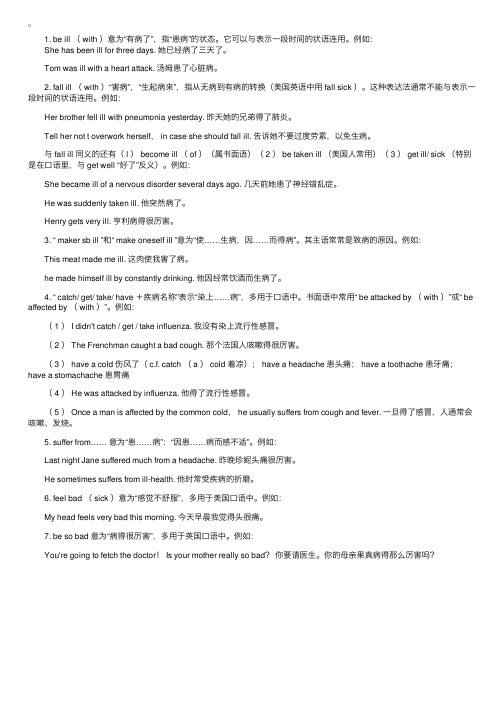
1. be ill ( with )意为“有病了”,指“患病”的状态。
它可以与表⽰⼀段时间的状语连⽤。
例如: She has been ill for three days. 她已经病了三天了。
Tom was ill with a heart attack. 汤姆患了⼼脏病。
2. fall ill ( with )“害病”,“⽣起病来”,指从⽆病到有病的转换(美国英语中⽤ fall sick )。
这种表达法通常不能与表⽰⼀段时间的状语连⽤。
例如: Her brother fell ill with pneumonia yesterday. 昨天她的兄弟得了肺炎。
Tell her not t overwork herself, in case she should fall ill. 告诉她不要过度劳累,以免⽣病。
与 fall ill 同义的还有( l ) become ill ( of )(属书⾯语)( 2 ) be taken ill (美国⼈常⽤)( 3 ) get ill/ sick (特别是在⼝语⾥,与 get well “好了”反义)。
例如: She became ill of a nervous disorder several days ago. ⼏天前她患了神经错乱症。
He was suddenly taken ill. 他突然病了。
Henry gets very ill. 亨利病得很厉害。
3. “ maker sb ill ”和“ make oneself ill ”意为“使……⽣病,因……⽽得病”。
其主语常常是致病的原因。
例如: This meat made me ill. 这⾁使我害了病。
he made himself ill by constantly drinking. 他因经常饮酒⽽⽣病了。
4. “ catch/ get/ take/ have +疾病名称”表⽰“染上……病”,多⽤于⼝语中。
- 1、下载文档前请自行甄别文档内容的完整性,平台不提供额外的编辑、内容补充、找答案等附加服务。
- 2、"仅部分预览"的文档,不可在线预览部分如存在完整性等问题,可反馈申请退款(可完整预览的文档不适用该条件!)。
- 3、如文档侵犯您的权益,请联系客服反馈,我们会尽快为您处理(人工客服工作时间:9:00-18:30)。
9 be seized with: 一般表示“突然患......病”。
例句:The patient was seized with apoplexy yesterday afernoon.病人昨天下午忽患中风。
10 be attacked with: 基本意是“为......疾病所侵袭”,常译成“患......病”。
4 get: 常作“生病”讲,后接表示疾病的名词。
例句:I think she's got epidemic meningitis. 我怀疑她得了流行性脑膜炎。
5 suffer from: 常用来表示“患病”,后接疾病名词,多用于医生与病人的交谈之中。
例句:Is there anybody in your family who has suffered from the same eye disease as
例句:On necropsy the patient was found to have been infected with tuberculosis as
well. 尸检发现病人还患过结核病。
21 be laid up with: 一般用来表示“患......病而卧床”或“卧病在床”。
3 contract:较正式的“生病”用语,常用于书面语。
例句:The patient may contract acute bacterial peritonitis, in which case a
surgical intervention should be considered. 该病人可能患有急性细菌性腹膜炎,在此情况下就得考虑手术处理。
其基本意为“为......病所折磨”,常用来表达“患......病”,其特征是,不仅表示患病的开始,还表示患病过程中所受之苦,特别是精神上的痛苦。
例句:For many years Harold was afflicted with edematous laryngitis. 哈德罗患水肿性喉炎多年了。
17 be stricken (down) with; be stricken with: 意为“为......疾病所侵袭”或“患......病”。
例句:She was stricken with fever yesterday. 她昨天发烧了。
18 be afflicted with:
19 be affected with (by): 一般用来表示“患......病”或“被......感染”。
例句:Both the lungs are affected by the infection. 两肺均已被感染。
20 be infected with: 意为“被......所感染”,“被......所侵袭”,可译成“患......病”。
25 be in bed with: 意为“患......病而卧床”。
例句:Maxwell is in bed with pulmonary emphysema. 麦克斯韦因患肺气肿而卧床。
Daniel was laid up for nearly a month with chronic appendicitis.
丹尼尔患慢性阑尾炎卧床近一个月。
22 be pulled down by: 意为“患......病而病倒”。
例句:Mozart was pulled down by anaphylactoid shock suddenly at 3 yesterday
13 expose...to (be exposed to): 以为“使......易患......病”,“易患......病”。
例句: An attack of fever weakens a child and exposes it to all kinds of
infections. 发烧使患儿虚弱,易患各种感染。
When having cold, children are exposed to pneumonia. 孩子感冒时易患肺炎。
14 suspect...of: 一般表示“怀疑......患......病”。
例句:On examination the patient was suspected of carcinomaof the
caetum.经检查,怀疑病人患盲肠癌。
15 fall (a) victim to: 其基本意为“成为......的牺牲品”,常可用来表示“患......病”。
例句: The longer a person has smoked, the greater becomes his liability to fall a
afternoon.莫扎特昨天下午三点多患过敏性休克而病倒。
23 be confined to bed with: 意为“患......病而卧床”或“卧病在床”。
例句:His wife was confined to bed with pyogenic osteomyelitis. 他妻子因患化脓性骨髓炎而卧病在床。
“生病了”的25种英文说法
1 have:表示“生病”,后常跟表示疾病的名词,是最通俗的说法,多用于口语。
例句:As I remember, my brother and sister both had severe asthmatic attacks in the
childhood.
例句:The patient troubled with constipation should have enough sleep, regular time
for meal and proper mastication of food. 便秘病人应有足够的睡眠,进食定时,对于食物要细嚼慢咽。
victim to long cancer. 一个人吸烟的时间越长,患肺癌的可能性就越大。
16 Be (come) down with/be taken down with: 意为“患......病而病倒”。
例句:After being in the rain, Tom came down with a bad cold.在外淋雨后,汤姆患重感冒病倒了。
例句:The doctor told me that I was sick(ill) with hypertension.医生说我患有高血压。
8 fall ill(sick) with; fall ill(sick): 表示“患......病”时,后面须加with。
例句:Jackie fell ill with a fever last week and has been in bed ever
例句:Attacked with acute myocardial inraction, the patient was surveilled for a
week in hospital. 病人患急性心肌梗塞后,在医院里监护了一个星期。
11 be troubled with: 意为“患......病”。
我记得,我弟弟和妹妹小时候都得过严重的哮喘病。
2 take/catch:均可表示“生病”,且含有“感染”之意。美国人多用take,英国人多用catch。
例句:Mary takes cold easily. 玛丽易患感冒。
Towards the end of the year, his son caught scarlet fever.快到年底的时候他儿子得了腥红热。
24 be bedridden with: “患......病而卧床”。
例句:Preston is bedridden with rheumatic heart disease, and the doctor fear he
will soon be no more. 普雷斯顿因患风湿心脏病卧床不起,医生们担心他生命垂危。
12 be vulnerable to: 一般常用来表示“易患......病”。
例句:Fibres from the macular region of the retina are particularly vulnerable to
inflammation. 视网膜斑区的纤维特别易患炎症。
you? 你家中还有没有人得过跟你一样的眼病?
6 (be)跟with,多见于英式英语。
例句:The patient is ill with influenza. 病人患流行性感冒。
7 (be) sick with: 多用于美式英语,与be ill with可以相互替换,但sick with不能改为sick of。
